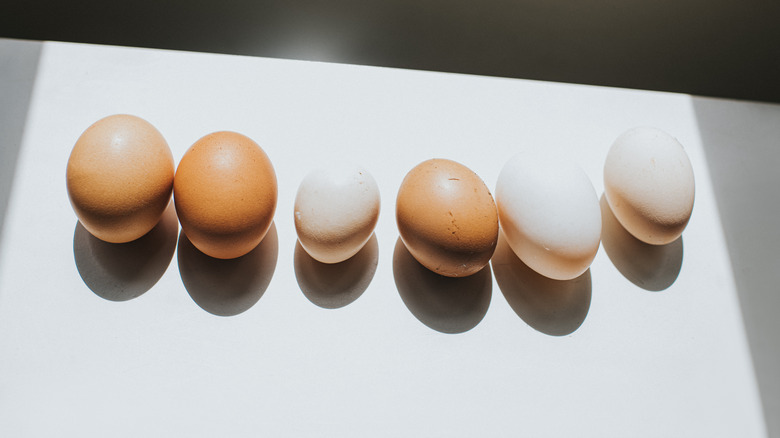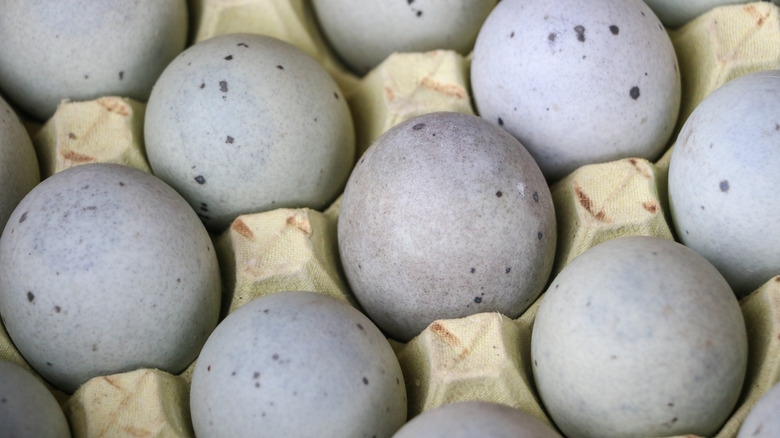Chicken Vs Duck Eggs: Is There A Flavor Difference?
Whether you like them fried, scrambled, boiled, or baked, there's no denying that eggs are one of the most versatile staple foods out there. When most of us think of eggs, we immediately picture chickens, but in actuality, tons of birds and even some other types of animals lay eggs, many of which are edible. Though chicken eggs are by far the most popular to consume worldwide, duck eggs are commonly eaten as well, particularly in East Asian cultures that prominently feature duck in their cuisines.
If you haven't had the opportunity to try duck eggs, you may be wondering what sets them apart from those of chickens. Crucially, duck eggs are both larger in size and contain a more massive yolk than chicken eggs (though they're nowhere near as large as ostrich eggs), which gives them a richer, creamier consistency and taste. They also differ somewhat in nutritional content, appearance, and in culinary use, though duck eggs can be prepared with all the same classic breakfast methods as chicken eggs.
All about chicken eggs
You've surely picked up a carton of eggs from the supermarket many times before to use in your breakfast, a stellar egg salad sandwich, or for extra-creamy brownies. But have you ever stopped to consider their origins more deeply, and why it is that chicken eggs are such a core staple in most diets?
While it is true that birds of all types lay eggs, according to the United States Food and Agriculture Organization, chickens make up 94% of the world poultry population and account for 93% of its egg production, so it's no wonder that these eggs are typically considered the default variety. The organization Compassion in World Farming estimates that in 2020, a staggering 1.6 trillion shell eggs were produced by 7.9 billion laying hens globally, the majority of which were raised industrially.
There are over 1,600 distinctive chicken breeds recognized throughout the world, and different breeds are known to produce eggs with different colors and appearances, most commonly white and brown. Chicken eggs vary in size, but a medium egg is about 1.75 ounces. Nutritionally, according to Healthline, an average chicken egg contains 149 calories, 10 grams of protein, and 11 grams of fat. Some recipes that call for eggs don't specify size, but others may require large or even jumbo-sized eggs. In any case, you can safely assume the recipe is calling for chicken eggs.
All about duck eggs
Even if you knew that ducks laid eggs, there's a pretty high chance you've never eaten one, or at least think of them as a rare delicacy. That's because duck eggs are much less common than chicken eggs worldwide. The FAO states that in 2020, ducks only made up 3% of the global poultry population. Duck eggs are most common in Asia, where non-chicken poultry species lay 10% of the continent's eggs, and where 89% of the world's duck population is kept.
For those of us exclusively familiar with chicken eggs, the size of duck eggs may be surprising. On average, duck eggs are 50% to 100% larger than chicken eggs. As a result, they contain more nutrients. A single duck egg has an average of 223 calories, 12 grams of protein, and 18.5 grams of fat. For anyone watching their cholesterol intake, duck eggs are probably not the best choice, as one egg contains 276% of your Daily Value. In addition to their overall larger size, the yolks of duck eggs are disproportionately bigger, which is why many describe the eggs as having a particular creaminess and rich flavor.
As the majority of duck eggs are produce in Asia, it's unsurprising that they are often associated with particular Asian cultural delicacies, such as Chinese century eggs. Supposedly, this dish originated 500 years ago, when a rural Chinese farmer found organically preserved duck eggs in a pool of limewater (also known as calcium hydroxide), which helps explain why duck eggs are still used to make century eggs today.
The main differences come down to scale
When it comes to eating duck eggs versus chicken eggs, most of their noticeable distinctions stem from their size differential. While the USDA classifies a variety of egg sizes, ranging from peewee (15 ounces per dozen or 1.25 ounces per egg) to jumbo (30 ounces per dozen or 2.5 ounces per egg), even the largest chicken egg is smaller than the average duck egg, which clocks in between 3 to 3.5 ounces. Duck eggs are higher in nutrients as a result, and because their yolks are also disproportionately large, they have a richer, more intense taste.
Even though some people swear by the superior texture and flavor of duck eggs, ducks still only make up a small percentage of the poultry market. With that in mind, it can be hard to get your hands on duck eggs at mainstream supermarkets, but you may have better luck at your local Asian grocers or farmer's market. Once you find them, duck eggs can be used to make many of the same delicious egg dishes as the chicken variety we're familiar with. However, when it comes to baking, they shouldn't be directly substituted in a recipe that calls for chicken eggs, as their mass and fat content differ, which may alter the outcome of your dish.



